From the Interim President, Provost, and Senior EVP: An Update to the Penn Community
April 26, 2024
To the Penn Community,
At Penn, we pursue our academic mission guided by fundamental commitments to upholding freedom of inquiry and open expression, while maintaining a safe, inclusive, and respectful campus community.
Over the last 24 hours, we have closely monitored the protest that evolved into an encampment on College Green. We have vigilantly supported the rights of our community members to protest peacefully. Representatives from Open Expression, University Life, and faculty leadership have engaged with some of the protestors, with limited access to the broader group.
Unfortunately, blatant violations of University policies and credible reports of harassing and intimidating conduct compel us to protect the safety and security of our campus community.
The encampment itself violates the University’s facilities policies. The harassing and intimidating comments and actions by some of the protesters, which were reported and documented by many in our community, violate Penn’s open expression guidelines and state and federal law, including Title VI of the Civil Rights Act. All members of our community deserve to access our facilities without fear of harassment or being subjected to discriminatory comments or threats.
The vandalism of the statue in front of College Hall with antisemitic graffiti was especially reprehensible and will be investigated as a hate crime.
As we have repeatedly emphasized, we will uphold free speech and the productive exchange of ideas, but we will not allow any actions that harass, threaten, or intimidate others. We have also said that the safety of our community is paramount, and we will live up to our commitment.
I am deeply saddened and troubled that our many efforts to respectfully engage in discourse, support open expression, and create a community that is free of hate and inclusive for everyone have been ignored by those who choose to disrupt and intimidate.
We have notified the protestors of their legal and policy violations. Failure to disband the encampment immediately and to adhere to Penn’s policies will result in sanctions consistent with our due process procedures as they apply to students, faculty, and staff.
—J. Larry Jameson, Interim President
—John L. Jackson, Jr., Provost
—Craig R. Carnaroli, Senior Executive Vice President
2024 School of Arts & Sciences Teaching Awards
The School of Arts & Sciences has announced the following recipients of its 2024 teaching awards. These honors will be presented on Thursday, May 2 at a reception that is open to the Penn community. The event will take place at 4 p.m. in room 200, College Hall.
Listed below are the School of Arts & Sciences’ recipients of its 2024 teaching awards:
Ira H. Abrams Memorial Award for Distinguished Teaching
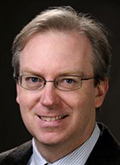
 This year’s recipients of SAS’s highest teaching honor are Charles Kane, the Christopher H. Browne Distinguished Professor of Physics, and Michael Weisberg, the Bess W. Heyman President’s Distinguished Professor and professor and chair of philosophy. The Ira H. Abrams Award was established in 1983 and recognizes teaching that is intellectually challenging and exceptionally coherent. The award honors faculty who embodies high standards of integrity and fairness, have a strong commitment to learning, and are open to new ideas.
This year’s recipients of SAS’s highest teaching honor are Charles Kane, the Christopher H. Browne Distinguished Professor of Physics, and Michael Weisberg, the Bess W. Heyman President’s Distinguished Professor and professor and chair of philosophy. The Ira H. Abrams Award was established in 1983 and recognizes teaching that is intellectually challenging and exceptionally coherent. The award honors faculty who embodies high standards of integrity and fairness, have a strong commitment to learning, and are open to new ideas.
Dr. Kane’s courses over the last fifteen years have included honors freshman physics courses, intermediate courses on electrodynamics, and graduate courses on quantum mechanics, statistical mechanics, and condensed matter physics. His colleagues repeatedly note that he is known for his true passion for the field of physics. Dr. Kane’s mastery of teaching is clear in his ability to “present the information in a compelling, rigorous, but understandable way.” Students praise his approachable learning environment in which he “never makes you feel like [you asked] a ‘stupid’ question.”
The ability to make students feel connected to the course material and open to new ideas is a trait shared by the other Abrams Award winner, Dr. Weisberg. He teaches four philosophy of biology/science courses for his department. Colleagues praise his teaching commitment of being “far more concerned about pursuing truth than breaking taboos, and he embodies this norm in the topics he exposes to his students.” Dr. Weisberg teaches a Penn Global seminar, Evolution’s Laboratory, in which he leads a trip to the Galapagos that connects students with the local community and transforms “students into true discoverer scientists,” as described by his colleagues.
Dennis M. DeTurck Award for Innovation in Teaching
 Simon Richter, the Class of 1942 Endowed Term Professor of German, is the 2024 recipient of the Dennis M. DeTurck Award for Innovation in Teaching. This award, which is named after Robert A. Fox Leadership Professor and former College of Arts & Sciences dean Dennis M. DeTurck, recognizes exceptional creativity and innovation in instruction.
Simon Richter, the Class of 1942 Endowed Term Professor of German, is the 2024 recipient of the Dennis M. DeTurck Award for Innovation in Teaching. This award, which is named after Robert A. Fox Leadership Professor and former College of Arts & Sciences dean Dennis M. DeTurck, recognizes exceptional creativity and innovation in instruction.
Colleagues describe Dr. Richter as an out-of-the-box thinker and innovative creator who has successfully shared his research on the critical global issues of climate change, water use, resilience, and sustainability by using animation projects. His popular Water Worlds class uses multidisciplinary methods to explore cultural responses to sea level rise and catastrophic flooding. Recently, he co-hosted a trip to the Netherlands with students to collaborate with local policy makers and artists on his Penn Climate Animation and Research Studio. Students said that in Dr. Richter’s classes, “learning felt like a process of collective discovery.”
Dean’s Award for Mentorship of Undergraduate Research
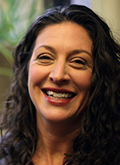
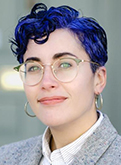 This year SAS honors Melissa Wilde, a professor of sociology and chair of the department, with the Dean’s Award for Mentorship of Undergraduate Research. The award is given to faculty members who have excelled in nurturing undergraduate students’ desires and abilities to conduct meaningful research. Colleagues describe Dr. Wilde’s mentorship of undergraduate research as “transformative” and “inspirational” for her students. She promotes hands-on research for her students, which trains them in archival and comparative historical methods, and engages them in statistical analyses of survey data. Additionally, Dr. Wilde is well known for inspiring honors students to conduct independent studies and for her willingness to provide insightful feedback. Students refer to her “unparalleled commitment” to fostering a welcoming learning environment that guides and develops their research skills.
This year SAS honors Melissa Wilde, a professor of sociology and chair of the department, with the Dean’s Award for Mentorship of Undergraduate Research. The award is given to faculty members who have excelled in nurturing undergraduate students’ desires and abilities to conduct meaningful research. Colleagues describe Dr. Wilde’s mentorship of undergraduate research as “transformative” and “inspirational” for her students. She promotes hands-on research for her students, which trains them in archival and comparative historical methods, and engages them in statistical analyses of survey data. Additionally, Dr. Wilde is well known for inspiring honors students to conduct independent studies and for her willingness to provide insightful feedback. Students refer to her “unparalleled commitment” to fostering a welcoming learning environment that guides and develops their research skills.
Dean’s Award for Distinguished Teaching by an Assistant Professor
This award recognizes a member of the junior faculty who demonstrates unusual promise as an educator. This year, SAS honors Julia Alekseyeva, an assistant professor of English. Students highly praise her teaching and assert that she fed their passion, changed the trajectory of their interests, and pushed them to become better observers. Colleagues report that Dr. Alekseyeva’s teaching is “compassionate and practical” and that she has mastered her ability to teach highly rigorous classes without making students feel overwhelmed or intimidated.
Dean’s Award for Distinguished Teaching by Affiliated Faculty

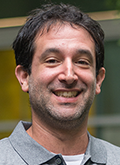 Jenine Maeyer, a senior lecturer in chemistry, and Michael Kane, a senior lecturer in neuroscience, are the recipients of this award, which recognizes contributions to undergraduate education made by the school’s non-standing faculty.
Jenine Maeyer, a senior lecturer in chemistry, and Michael Kane, a senior lecturer in neuroscience, are the recipients of this award, which recognizes contributions to undergraduate education made by the school’s non-standing faculty.
Jenine Maeyer has an enduring record of making important contributions to the chemistry department. Dr. Maeyer has led Penn’s chemistry laboratory program since 2009 and has been on the forefront of incorporating active learning techniques and introducing new assignment formats. She started a chemistry service-learning course that provides undergraduate students with opportunities to improve their scientific communication abilities and teaching skills. Dr. Maeyer is highly focused on providing a nurturing learning environment for her students. Students say she is “approachable and helpful” and “easy and fun to talk to and makes sure you clearly understand the content.”
Dr. Kane teaches a variety of courses, including two lecture courses, a lab course, and a senior seminar known for covering the latest findings in his field. His course Drugs, Brain and Mind is a highly sought-after course by incoming undergraduate students, who refer to his course as a “must-take” class at Penn. He makes a profound impact on his students as he challenges them to think about their research in a new way and routinely offers his guidance to build their confidence.
Liberal and Professional Studies Award for Distinguished Teaching in Undergraduate and Post-Baccalaureate Programs

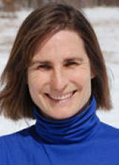 Virginia Millar, lead lecturer of four undergraduate courses in the College of Liberal and Professional Studies (LPS), including the Online Applied Positive Psychology Certificate, is the recipient of this award, which recognizes teaching in LPS’s undergraduate and post-baccalaureate programs. Dr. Millar is an instructor of positive education and applied positive psychology for undergraduate and graduate students. Her colleagues feel that she can “ignite students’ excitement for the subject matter,” which is a vital component of effective instruction. Students attest that “her discussions are thought-provoking” and that she has “unparalleled skill in explaining complex concepts in an accessible manner.”
Virginia Millar, lead lecturer of four undergraduate courses in the College of Liberal and Professional Studies (LPS), including the Online Applied Positive Psychology Certificate, is the recipient of this award, which recognizes teaching in LPS’s undergraduate and post-baccalaureate programs. Dr. Millar is an instructor of positive education and applied positive psychology for undergraduate and graduate students. Her colleagues feel that she can “ignite students’ excitement for the subject matter,” which is a vital component of effective instruction. Students attest that “her discussions are thought-provoking” and that she has “unparalleled skill in explaining complex concepts in an accessible manner.”
Liberal and Professional Studies Award for Distinguished Teaching in Professional Graduate Programs
Sarah Willig, a lecturer in the College of Liberal and Professional Studies, is the recipient of this award, which recognizes teaching excellence in LPS graduate programs. She is honored for her teaching in the master of environmental studies program. Dr. Willig gives her students a higher appreciation for the environment by taking them on field trips and promoting independent projects. It is her passion for sharing her expertise with the next generation that earns her numerous accolades from her students.
Dean’s Award for Distinguished Teaching by Graduate Students
This award recognizes graduate students for teaching that is intellectually rigorous and has a considerable impact on undergraduate students. This year’s awardees are:
- Meredith Hacking, Germanic Languages & Literatures
- Matilda Hemming, English
- Tessa Huttenlocher, Sociology
- Ethan Plaue, English
- Daniel Shapiro, Political Science
- Derek Yang, Chemistry
- Youngbin Yoon, Philosophy
Weitzman School of Design’s G. Holmes Perkins Teaching Awards
Rashida Ng, Michael C. Henry, and Jamaal Green have been honored with G. Holmes Perkins Distinguished Teaching Awards for Academic Year 2023-2024. The awards are presented annually to three members of the Weitzman faculty, based on nominations by students, and recognize distinguished teaching and innovation in the classroom, seminar, or studio.
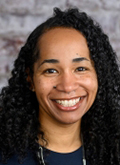 Rashida Ng, MArch’01, is an architect, the Presidential Associate Professor of Architecture, and chair of undergraduate architecture. Her courses include Design, Race, and Climate Justice, which examines material, spatial, and ecological practices in architecture and design that perpetuate racial inequities and exacerbate climate injustices. According to one student who nominated her, “As a student of Rashida, I have learned how to use architecture as a tool for social justice and community engagement.”
Rashida Ng, MArch’01, is an architect, the Presidential Associate Professor of Architecture, and chair of undergraduate architecture. Her courses include Design, Race, and Climate Justice, which examines material, spatial, and ecological practices in architecture and design that perpetuate racial inequities and exacerbate climate injustices. According to one student who nominated her, “As a student of Rashida, I have learned how to use architecture as a tool for social justice and community engagement.”
Ms. Ng’s research lies at the intersection of social equity and environmental justice. Focused on housing insecurity, Ms. Ng examines historical and present-day design practices that perpetuate racial inequities and health disparities in Black, Indigenous, and other communities of color.
 Michael C. Henry, GME’77, is an adjunct professor in the department of historic preservation who teaches courses focusing on the deterioration and pathologies of buildings and on diagnostic methodologies and monitoring of buildings. One of the students who nominated him said, “He’s very down to earth and is such a supportive professor, taking time to get to know us all on a personal level.”
Michael C. Henry, GME’77, is an adjunct professor in the department of historic preservation who teaches courses focusing on the deterioration and pathologies of buildings and on diagnostic methodologies and monitoring of buildings. One of the students who nominated him said, “He’s very down to earth and is such a supportive professor, taking time to get to know us all on a personal level.”
Mr. Henry is principal engineer/architect and founding partner of Watson & Henry Associates, where he has practiced for over 30 years, consulting for institutions, cultural heritage stewards, and architects and engineers throughout the United States and in India, Cuba, Mexico, Brazil, and Tunisia.
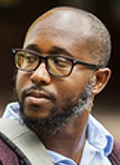 Jamaal Green is an assistant professor in the department of city & regional planning whose courses include Modeling Geographic Objects, an introduction to geographic information systems (GIS) for a variety of environmental science, planning, and management applications. Among the nominations for him, one student wrote, “While having no prior exposure to the platforms or coding was a significant undertaking, Jamaal’s belief in the class slowly but surely encouraged my own self-belief and confidence in the skills I would acquire by the end of the semester.”
Jamaal Green is an assistant professor in the department of city & regional planning whose courses include Modeling Geographic Objects, an introduction to geographic information systems (GIS) for a variety of environmental science, planning, and management applications. Among the nominations for him, one student wrote, “While having no prior exposure to the platforms or coding was a significant undertaking, Jamaal’s belief in the class slowly but surely encouraged my own self-belief and confidence in the skills I would acquire by the end of the semester.”
Dr. Green is a planner and geographer who is interested in the ways that the organization of our built environments exacerbate or inhibit social inequality. His research interests include exploring the connections between land use and economic development planning, specifically concerning the role of industrial lands in urban labor markets and greater labor market restructuring, and the application of spatial analysis to policy problems.
The G. Holmes Perkins Distinguished Teaching Award is named in honor of the late G. Holmes Perkins, who served as dean of the Graduate School of Fine Arts, as the Weitzman School was then known, from 1951–1971.
One award given each year recognizes teaching at the undergraduate level, and two awards are given for teaching at the graduate level, for a member of the non-standing faculty and a member of the standing faculty.
Ms. Ng, Mr. Henry, and Dr. Green will be formally honored at the Weitzman Commencement Exercises on Saturday, May 18, 2024.


 This year’s recipients of SAS’s highest teaching honor are Charles Kane, the Christopher H. Browne Distinguished Professor of Physics, and Michael Weisberg, the Bess W. Heyman President’s Distinguished Professor and professor and chair of philosophy. The Ira H. Abrams Award was established in 1983 and recognizes teaching that is intellectually challenging and exceptionally coherent. The award honors faculty who embodies high standards of integrity and fairness, have a strong commitment to learning, and are open to new ideas.
This year’s recipients of SAS’s highest teaching honor are Charles Kane, the Christopher H. Browne Distinguished Professor of Physics, and Michael Weisberg, the Bess W. Heyman President’s Distinguished Professor and professor and chair of philosophy. The Ira H. Abrams Award was established in 1983 and recognizes teaching that is intellectually challenging and exceptionally coherent. The award honors faculty who embodies high standards of integrity and fairness, have a strong commitment to learning, and are open to new ideas. Simon Richter, the Class of 1942 Endowed Term Professor of German, is the 2024 recipient of the Dennis M. DeTurck Award for Innovation in Teaching. This award, which is named after Robert A. Fox Leadership Professor and former College of Arts & Sciences dean Dennis M. DeTurck, recognizes exceptional creativity and innovation in instruction.
Simon Richter, the Class of 1942 Endowed Term Professor of German, is the 2024 recipient of the Dennis M. DeTurck Award for Innovation in Teaching. This award, which is named after Robert A. Fox Leadership Professor and former College of Arts & Sciences dean Dennis M. DeTurck, recognizes exceptional creativity and innovation in instruction.
 This year SAS honors Melissa Wilde, a professor of sociology and chair of the department, with the Dean’s Award for Mentorship of Undergraduate Research. The award is given to faculty members who have excelled in nurturing undergraduate students’ desires and abilities to conduct meaningful research. Colleagues describe Dr. Wilde’s mentorship of undergraduate research as “transformative” and “inspirational” for her students. She promotes hands-on research for her students, which trains them in archival and comparative historical methods, and engages them in statistical analyses of survey data. Additionally, Dr. Wilde is well known for inspiring honors students to conduct independent studies and for her willingness to provide insightful feedback. Students refer to her “unparalleled commitment” to fostering a welcoming learning environment that guides and develops their research skills.
This year SAS honors Melissa Wilde, a professor of sociology and chair of the department, with the Dean’s Award for Mentorship of Undergraduate Research. The award is given to faculty members who have excelled in nurturing undergraduate students’ desires and abilities to conduct meaningful research. Colleagues describe Dr. Wilde’s mentorship of undergraduate research as “transformative” and “inspirational” for her students. She promotes hands-on research for her students, which trains them in archival and comparative historical methods, and engages them in statistical analyses of survey data. Additionally, Dr. Wilde is well known for inspiring honors students to conduct independent studies and for her willingness to provide insightful feedback. Students refer to her “unparalleled commitment” to fostering a welcoming learning environment that guides and develops their research skills.
 Jenine Maeyer, a senior lecturer in chemistry, and Michael Kane, a senior lecturer in neuroscience, are the recipients of this award, which recognizes contributions to undergraduate education made by the school’s non-standing faculty.
Jenine Maeyer, a senior lecturer in chemistry, and Michael Kane, a senior lecturer in neuroscience, are the recipients of this award, which recognizes contributions to undergraduate education made by the school’s non-standing faculty.
 Virginia Millar, lead lecturer of four undergraduate courses in the College of Liberal and Professional Studies (LPS), including the Online Applied Positive Psychology Certificate, is the recipient of this award, which recognizes teaching in LPS’s undergraduate and post-baccalaureate programs. Dr. Millar is an instructor of positive education and applied positive psychology for undergraduate and graduate students. Her colleagues feel that she can “ignite students’ excitement for the subject matter,” which is a vital component of effective instruction. Students attest that “her discussions are thought-provoking” and that she has “unparalleled skill in explaining complex concepts in an accessible manner.”
Virginia Millar, lead lecturer of four undergraduate courses in the College of Liberal and Professional Studies (LPS), including the Online Applied Positive Psychology Certificate, is the recipient of this award, which recognizes teaching in LPS’s undergraduate and post-baccalaureate programs. Dr. Millar is an instructor of positive education and applied positive psychology for undergraduate and graduate students. Her colleagues feel that she can “ignite students’ excitement for the subject matter,” which is a vital component of effective instruction. Students attest that “her discussions are thought-provoking” and that she has “unparalleled skill in explaining complex concepts in an accessible manner.” Rashida Ng, MArch’01, is an architect, the Presidential Associate Professor of Architecture, and chair of undergraduate architecture. Her courses include Design, Race, and Climate Justice, which examines material, spatial, and ecological practices in architecture and design that perpetuate racial inequities and exacerbate climate injustices. According to one student who nominated her, “As a student of Rashida, I have learned how to use architecture as a tool for social justice and community engagement.”
Rashida Ng, MArch’01, is an architect, the Presidential Associate Professor of Architecture, and chair of undergraduate architecture. Her courses include Design, Race, and Climate Justice, which examines material, spatial, and ecological practices in architecture and design that perpetuate racial inequities and exacerbate climate injustices. According to one student who nominated her, “As a student of Rashida, I have learned how to use architecture as a tool for social justice and community engagement.” Michael C. Henry, GME’77, is an adjunct professor in the department of historic preservation who teaches courses focusing on the deterioration and pathologies of buildings and on diagnostic methodologies and monitoring of buildings. One of the students who nominated him said, “He’s very down to earth and is such a supportive professor, taking time to get to know us all on a personal level.”
Michael C. Henry, GME’77, is an adjunct professor in the department of historic preservation who teaches courses focusing on the deterioration and pathologies of buildings and on diagnostic methodologies and monitoring of buildings. One of the students who nominated him said, “He’s very down to earth and is such a supportive professor, taking time to get to know us all on a personal level.” Jamaal Green is an assistant professor in the department of city & regional planning whose courses include Modeling Geographic Objects, an introduction to geographic information systems (GIS) for a variety of environmental science, planning, and management applications. Among the nominations for him, one student wrote, “While having no prior exposure to the platforms or coding was a significant undertaking, Jamaal’s belief in the class slowly but surely encouraged my own self-belief and confidence in the skills I would acquire by the end of the semester.”
Jamaal Green is an assistant professor in the department of city & regional planning whose courses include Modeling Geographic Objects, an introduction to geographic information systems (GIS) for a variety of environmental science, planning, and management applications. Among the nominations for him, one student wrote, “While having no prior exposure to the platforms or coding was a significant undertaking, Jamaal’s belief in the class slowly but surely encouraged my own self-belief and confidence in the skills I would acquire by the end of the semester.”.jpg) Francesca S. Seidita, the former director of budget planning in the Office of Penn Budget Planning & Analysis, died on March 28 after a long illness. She was 68.
Francesca S. Seidita, the former director of budget planning in the Office of Penn Budget Planning & Analysis, died on March 28 after a long illness. She was 68. Dolores Albarracín is the Alexandra Heyman Nash University Professor; a PIK Professor with appointments in the Annenberg School for Communication, School of Arts & Sciences, School of Nursing, and Wharton School; and the director of the Annenberg Public Policy Center’s communication science division. As a social psychologist who studies social cognition, attitudes, and behavioral change, Dr. Albarracín has published six books and nearly 200 journal articles. She is a fellow of the American Psychological Association, Association for Psychological Science, Society for Experimental Social Psychology, and American Academy of Political and Social Science and is the editor of the Journal of Personality and Social Psychology: Attitudes and Social Cognition. The Society for Personality and Social Psychology, of which Dr. Albarracín is past president, recognized her with the Award for Outstanding Scientific Contributions to Research on Attitudes and Social Influence in 2018 and the Diener Award in Social Psychology in 2020. She was recently elected a 2024 American Association for the Advancement of Science (AAAS) Fellow.
Dolores Albarracín is the Alexandra Heyman Nash University Professor; a PIK Professor with appointments in the Annenberg School for Communication, School of Arts & Sciences, School of Nursing, and Wharton School; and the director of the Annenberg Public Policy Center’s communication science division. As a social psychologist who studies social cognition, attitudes, and behavioral change, Dr. Albarracín has published six books and nearly 200 journal articles. She is a fellow of the American Psychological Association, Association for Psychological Science, Society for Experimental Social Psychology, and American Academy of Political and Social Science and is the editor of the Journal of Personality and Social Psychology: Attitudes and Social Cognition. The Society for Personality and Social Psychology, of which Dr. Albarracín is past president, recognized her with the Award for Outstanding Scientific Contributions to Research on Attitudes and Social Influence in 2018 and the Diener Award in Social Psychology in 2020. She was recently elected a 2024 American Association for the Advancement of Science (AAAS) Fellow. Edward D. Mansfield is the Hum Rosen Professor of Political Science and director of the Christopher H. Browne Center for International Politics in the School of Arts & Sciences. His research focuses on international political economy, international institutions, and international security. He is the author of Power, Trade, and War; Electing to Fight: Why Emerging Democracies Go to War; Votes, Vetoes, and the Political Economy of International Trade Agreements; and The Political Economy of International Trade. A recipient of the 2000 Karl W. Deutsch Award in International Relations and Peace Research, Dr. Mansfield has served as a national fellow of the Hoover Institution, chair of the International Political Economy Society’s Steering Committee, vice president of the International Studies Association, and a term member of the Council on Foreign Relations. Dr. Mansfield is co-editor of the Cambridge University Press Elements Series in International Relations, and he has served as co-editor of the University of Michigan Press Series on International Political Economy and associate editor of the journal International Organization.
Edward D. Mansfield is the Hum Rosen Professor of Political Science and director of the Christopher H. Browne Center for International Politics in the School of Arts & Sciences. His research focuses on international political economy, international institutions, and international security. He is the author of Power, Trade, and War; Electing to Fight: Why Emerging Democracies Go to War; Votes, Vetoes, and the Political Economy of International Trade Agreements; and The Political Economy of International Trade. A recipient of the 2000 Karl W. Deutsch Award in International Relations and Peace Research, Dr. Mansfield has served as a national fellow of the Hoover Institution, chair of the International Political Economy Society’s Steering Committee, vice president of the International Studies Association, and a term member of the Council on Foreign Relations. Dr. Mansfield is co-editor of the Cambridge University Press Elements Series in International Relations, and he has served as co-editor of the University of Michigan Press Series on International Political Economy and associate editor of the journal International Organization.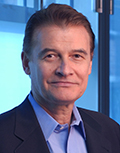 Virgil Percec, the P. Roy Vagelos Professor of Chemistry in the School of Arts & Sciences, is a chemist whose interests lie at the interface between organic, macromolecular, and supramolecular chemistry; catalysis; nanoscience; complex systems; and synthetic biology. He holds 80 American and European patents and has presented more than 1,296 endowed, plenary, and invited lectures in more than 30 countries. He also has more than 827 publications, including 20 books. He has received many honors, including honorary memberships in the Romanian, European, and Royal Swedish of Engineering Sciences Academies, the National Science Foundation Research Award for Creativity in Research (1990, 1995, 2000, 2016), and the ACS Inaugural Kavli Foundation Innovation in Chemistry Award and lecture (2011). He came to Penn in 1999 from Case Western Reserve University, where he held the Leonard Case Jr. Chair of Macromolecular Science and Engineering.
Virgil Percec, the P. Roy Vagelos Professor of Chemistry in the School of Arts & Sciences, is a chemist whose interests lie at the interface between organic, macromolecular, and supramolecular chemistry; catalysis; nanoscience; complex systems; and synthetic biology. He holds 80 American and European patents and has presented more than 1,296 endowed, plenary, and invited lectures in more than 30 countries. He also has more than 827 publications, including 20 books. He has received many honors, including honorary memberships in the Romanian, European, and Royal Swedish of Engineering Sciences Academies, the National Science Foundation Research Award for Creativity in Research (1990, 1995, 2000, 2016), and the ACS Inaugural Kavli Foundation Innovation in Chemistry Award and lecture (2011). He came to Penn in 1999 from Case Western Reserve University, where he held the Leonard Case Jr. Chair of Macromolecular Science and Engineering. 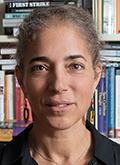 Deborah A. Thomas is the R. Jean Brownlee Professor of Anthropology in the School of Arts & Sciences, where she is also core faculty in gender, sexuality and women’s studies with secondary appointments in the Graduate School of Education and the department of Africana studies. Her written work includes Political Life in the Wake of the Plantation: Sovereignty, Witnessing, Repair, for which she won the Gordon K. and Sybil Lewis Book Award from the Caribbean Studies Association and the Senior Book Prize from the American Ethnological Society. Dr. Thomas also co-directed and co-produced two films, Bad Friday: Rastafari After Coral Gardens and Four Days in May, both of which explore issues of culture, power, violence, and post-colonialism in Jamaica. Before her life in academia, Dr. Thomas was a professional dancer with the New York-based Urban Bush Women, a company committed to using art as a means of addressing issues of social justice and encouraging civic engagement.
Deborah A. Thomas is the R. Jean Brownlee Professor of Anthropology in the School of Arts & Sciences, where she is also core faculty in gender, sexuality and women’s studies with secondary appointments in the Graduate School of Education and the department of Africana studies. Her written work includes Political Life in the Wake of the Plantation: Sovereignty, Witnessing, Repair, for which she won the Gordon K. and Sybil Lewis Book Award from the Caribbean Studies Association and the Senior Book Prize from the American Ethnological Society. Dr. Thomas also co-directed and co-produced two films, Bad Friday: Rastafari After Coral Gardens and Four Days in May, both of which explore issues of culture, power, violence, and post-colonialism in Jamaica. Before her life in academia, Dr. Thomas was a professional dancer with the New York-based Urban Bush Women, a company committed to using art as a means of addressing issues of social justice and encouraging civic engagement. Martha A.Q. Curley, a professor of nursing at Penn Nursing and the Ruth M. Colket Endowed Chair in Pediatric Nursing Science at Children’s Hospital of Philadelphia, will receive the 2024 Research Innovation and Translation Achievement Award from the American Thoracic Society (ATS).
Martha A.Q. Curley, a professor of nursing at Penn Nursing and the Ruth M. Colket Endowed Chair in Pediatric Nursing Science at Children’s Hospital of Philadelphia, will receive the 2024 Research Innovation and Translation Achievement Award from the American Thoracic Society (ATS). Penn Dental Medicine’s Eric Stoopler, a professor of oral medicine, has been recognized by the American Academy of Oral Medicine as this year’s recipient of its Craig S. Miller Diamond Pin Award. The award was presented as part of the academy’s annual meeting, held in Orlando, Florida, April 17-20.
Penn Dental Medicine’s Eric Stoopler, a professor of oral medicine, has been recognized by the American Academy of Oral Medicine as this year’s recipient of its Craig S. Miller Diamond Pin Award. The award was presented as part of the academy’s annual meeting, held in Orlando, Florida, April 17-20.